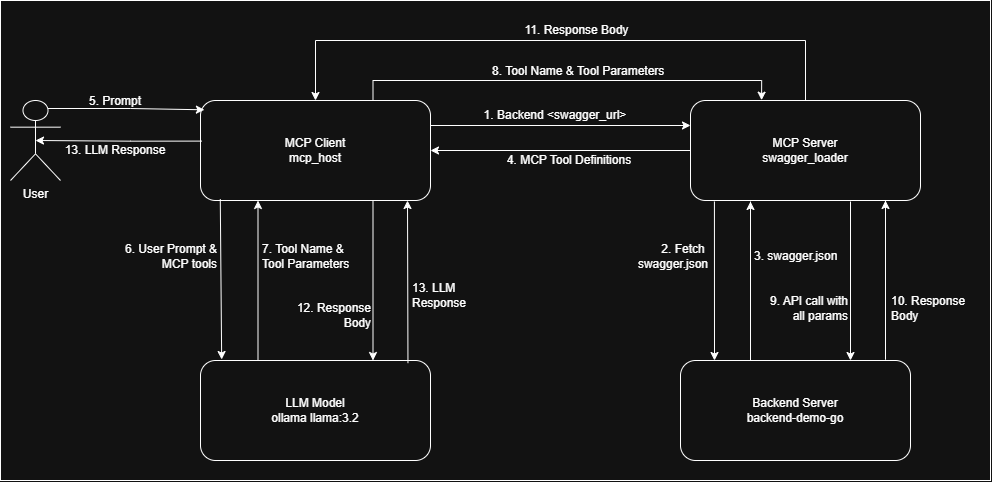Information
# swagger-mcp
## Overview
\`swagger-mcp\` is a tool designed to scrape Swagger UI by extracting the \`swagger.json\` file and dynamically generating well-defined mcp tools at runtime. These tools can be utilized by the MCP client for further tool selection.
## Demo Video
Check out demo video showcasing the project in action:
[](https://www.linkedin.com/posts/danish-j-sheikh_mcp-modelcontextprotocol-llm-activity-7300786040389218304-qfNk?utm_source=share&utm_medium=member_ios&rcm=ACoAAEGFv8IB3uEbMighmc1gppVW4RcC1OUoSC4)
## Support
If you find this project valuable, please support me on **LinkedIn** by:
- Liking and sharing our demo post
- Leaving your thoughts and feedback in the comments
- Connecting with me for future updates
Your support on LinkedIn will help me reach more people and improve the project!
## Prerequisites
To use \`swagger-mcp\`, ensure you have the following dependencies:
1. **LLM Model API Key / Local LLM**: Requires access to OpenAI, Claude, or Ollama models.
2. **Any MCP Client**: (Used [mark3labs - mcphost](https://github.com/mark3labs/mcphost))
## Installation and Setup
Follow these steps to install and run \`swagger-mcp\`:
\`\`\`sh
go install github.com/danishjsheikh/swagger-mcp@latest
swagger-mcp
\`\`\`
## Run Configuration
To run \`swagger-mcp\` directly, use:
\`\`\`sh
swagger-mcp --specUrl=https://your_swagger_api_docs.json
\`\`\`
Main flags:
- \`--specUrl\`: Swagger/OpenAPI JSON URL (required)
- \`--sseMode\`: Run in SSE mode (default: false, if true runs as SSE server, otherwise uses stdio)
- \`--sseAddr\`: SSE server listen address in IP:Port or :Port format (if empty, will use IP:Port from --sseUrl)
- \`--sseUrl\`: SSE server base URL (if empty, will use sseAddr to generate, e.g. http://IP:Port or http://localhost:Port)
- If both --sseAddr and --sseUrl are set, they are used as-is without auto-complement.
- \`--baseUrl\`: Override base URL for API requests
- \`--security\`: API security type (\`basic\`, \`apiKey\`, or \`bearer\`)
- \`--basicAuth\`: Basic auth in user:password format
- \`--bearerAuth\`: Bearer token for Authorization header
- \`--apiKeyAuth\`: API key(s), format \`passAs:name=value\` (e.g. \`header:token=abc,query:user=foo,cookie:sid=xxx\`)
- See main.go for all supported flags and options.
## MCP Configuration
To integrate with \`mcphost\`, include the following configuration in \`.mcp.json\`:
\`\`\`json
\{
"mcpServers":
\{
"swagger_loader": \{
"command": "swagger-mcp",
"args": ["--specUrl="]
\}
\}
\}
\`\`\`
## Demo Flow
1. Some Backend:
\`\`\`sh
go install github.com/danishjsheikh/go-backend-demo@latest
go-backend-demo
\`\`\`
2. Ollama
\`\`\`sh
ollama run llama3.2
\`\`\`
3. MCP Client
\`\`\`sh
go install github.com/mark3labs/mcphost@latest
mcphost -m ollama:llama3.2 --config <.mcp.json_file_path>
\`\`\`
## Flow Diagram

## Need Help
I am working on **improving tool definitions** to enhance:
**Better error handling** for more accurate responses
**LLM behavior control** to ensure it relies **only on API responses** and does not use its own memory
**Preventing hallucinations** and **random data generation** by enforcing strict data retrieval from APIs
If you have insights or suggestions on improving these aspects, please contribute by:
- **Sharing your experience** with similar implementations
- **Suggesting modifications** to tool definitions
- **Providing feedback** on current limitations
Your input will be invaluable in making this tool more reliable and effective!
